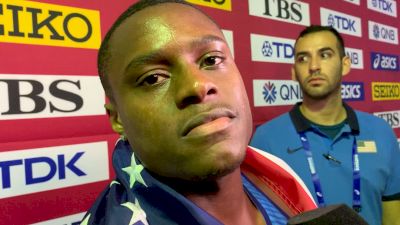Christian Coleman Delivers 100m Gold Under The Bright Lights In Doha
Christian Coleman Delivers 100m Gold Under The Bright Lights In Doha
In the 100m final, Christian Coleman shone brighter than the light show that illuminated the track with his name during his introduction.

In the 100m final, Christian Coleman shone brighter than the lights that illuminated the track with his name during his introduction at Khalifa International Stadium.
The 23-year-old set the track ablaze en route to his first global 100m gold with a 9.76 PR, which is the fastest winning time at a world championships since Usain Bolt’s 9.58 world record in 2009, and puts him at world No. 6 all-time and makes him the third-fastest American ever.
From the gun, Coleman left no doubt as he immediately burst out to a sizable lead, leaving 2017's world champion, Justin Gatlin, in the role of the hunter as he tried to claw back.
The 37-year-old Gatlin finished runner-up in 9.89 to occupy the second spot on the podium for Team USA alongside fellow Tennessee alum Coleman. Canada's Andre De Grasse, one of the darlings of the 2016 Olympic Games, capped his season with a remarkable comeback in a 9.90 PR for bronze.
CHRISTIAN COLEMAN WORLD CHAMPION?
— FloTrack (@FloTrack) September 28, 2019
pic.twitter.com/4fWwlv1iCk
Coleman's victory is an accolade that affirms what we've known since 2017: the mantle of "world's fastest man" in the post-Bolt 100m era rests on Coleman's shoulders. Now, he has his first world gold medal to make it official.
Two years ago, after putting together one of the greatest collegiate sprint careers ever, Coleman ventured to the IAAF World Championships for the first time, but fell short of a perfect season when Justin Gatlin overcame him in London for the win.
Today, he fittingly turned the tables on Gatlin. While some may see it as a symbolic changing of the guard, it doesn't seem like Coleman's elder will be going anywhere as long as he's running sub-10.
The victory may have been especially sweet for Coleman after nearly missing the opportunity to compete at the world championships. The sprinter initially faced a two-year ban for whereabouts violations, but the United States Anti-Doping Agency (USADA) later dropped his case due to a misinterpretation of World Anti-Doping Agency (WADA) protocol.